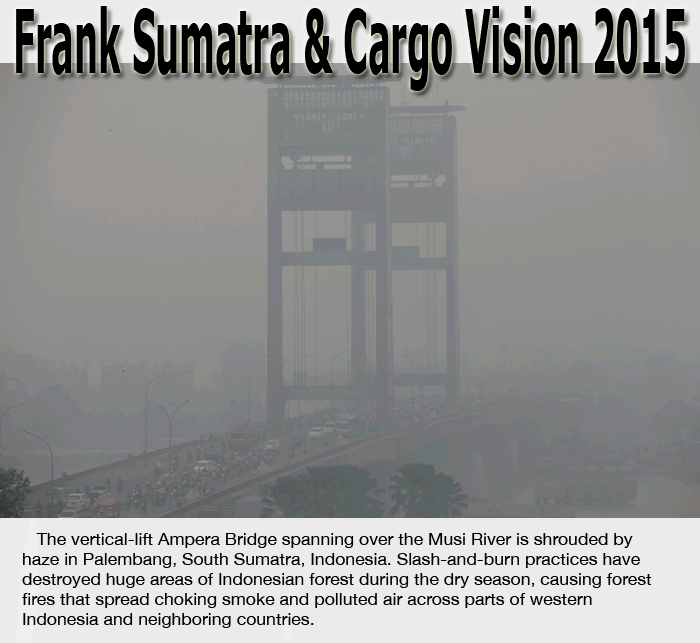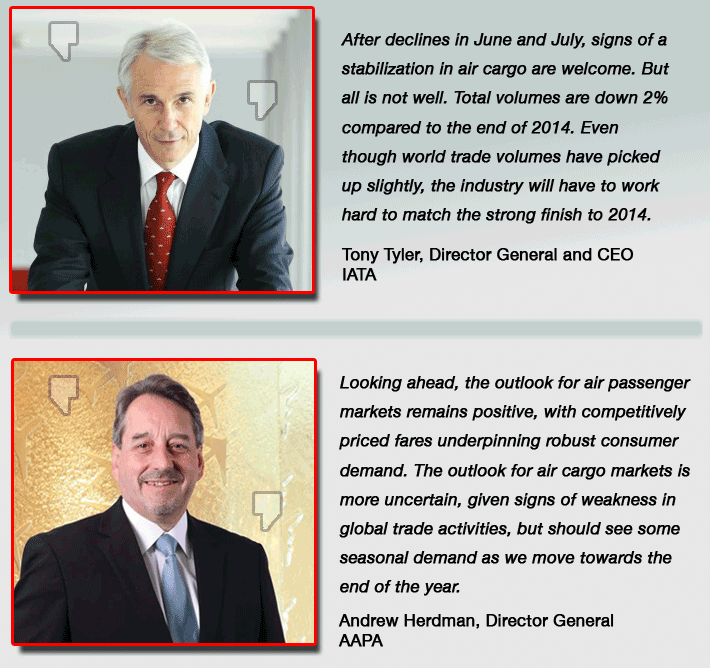
The razing
of vast swathes of pristine Indonesian forest in Sumatra and
Kalimantan by palm oil companies has left both locals and
the city dwellers of Kuala Lumpur and Singapore smothered
in smog clouds. At its worst, as your correspondent’s
throttled lungs can testify, the air, even in afflicted city
centers, is dangerously putrid, and vision can become so limited
it is more reminiscent of a mountaintop snowstorm than midday
on a major high street.
Nowhere
To Run, Nowhere To Hide
While caught in this tropical
perfectly terrible storm, for no particular reason your correspondent
thought of the air freight industry. Like the people of Singapore
and KL, it has been beset over the last month by a welter
of negative headwinds that it cannot dodge.
Indeed, for much of the last
year, the outlook has been almost relentlessly bleak. China’s
‘soft landing’, global share price and currency
tumult, the recessionary look of some BRIC and European economies,
war in the Middle East - all have left analysts scratching
around for any signs of economic or trade positivity.
U.S. growth is the exception,
not least for Transpacific trades, but fears surround the
potential impact of an income rate rise by the Federal Reserve
later this year and the impact this might have on currencies
and consumer demand from emerging markets.
And elsewhere the optimism cupboard
is decidedly bare.
Speaking on the sidelines of
the GLCS LogiSYM conference and expo in Malaysia in Kuala
Lumpur last week, the logistics procurement manager for a
major Europe-based electronics company said he thought rates
would remain low into 2016 because there was little on the
demand side to suggest a major rebound, except for the traditional
end of year retailing peak. “Although even then,”
he added, “most retailers already have inventory so
at best I’d expect a smallish bump linked to new product
launches.
“We did use air more ahead
of China’s Golden Week holiday [when factories close
for at least a week] at the start of October as we needed
to get product out, but it was a short-term thing. We use
shipping as much as we possibly can just like everyone else.
“The economic outlook
in Europe is not good. The U.S. is better. China, is ‘wait
and see’ for us.”
Yet despite all the poor economic
forecasts, the latest round of statistics on air freight rates
and growth were surprisingly upbeat, at least in the context
of a stricken global economy.
 IATA’s
figures for August revealed a stabilization in global air
freight markets after two months of contraction. Global air
cargo volumes rose 0.2% compared to the same month a year
ago. Although such modest growth is hardly a lightning rod
for freight managers, it is a welcome crutch after the year-on-year
declines recorded in June and July. IATA’s
figures for August revealed a stabilization in global air
freight markets after two months of contraction. Global air
cargo volumes rose 0.2% compared to the same month a year
ago. Although such modest growth is hardly a lightning rod
for freight managers, it is a welcome crutch after the year-on-year
declines recorded in June and July.
As is becoming usual, most of
the positivity came from carriers in the Middle East which
saw collective growth of 10.4% in August. European carriers
saw marginal 0.7% expansion, although this was offset by a
1% decline from Asia Pacific based airlines, a surprising
3.3% contraction in North America and a 7.3% decline in Latin
America.
Drewry’s East-West Air
Freight Price Index also recovered in August, up 3.7 points
to a reading of 93.7 after also recording a 2-point recovery
in July. The index was lifted by strengthening rates on Asia
origin trades into North America and Europe, despite notable
declines in pricing on both legs of the Transatlantic.
The analyst was upbeat for September.
“Drewry expects air freight pricing to have strengthened
- albeit low compared to the same period last year - through
September, and for this to continue into October as new product
launches boost short term demand,” reported Drewry Sea
& Air Shipper Insight.
August figures from the Association
of Asia Pacific Airlines, however, offered only limited positivity
as the Asian carriers most closely linked to the world’s
leading export markets reported relatively weak demand.
AAPA said the weakness in air
cargo markets had extended through August, with demand in
freight ton kilometers terms recording a slight 0.3% decline
compared to the same month last year. Offered freight capacity
grew by 3.3% and the average international cargo load factor
of carriers fell by 2.2 percentage points to 61.0% for the
month.
Andrew Herdman, AAPA Director
General, said that while passenger markets had seen high single-digit
growth over the first eight months of the year, cargo markets
had reflected a further slowdown in world trade.
“Overall, however, after
accounting for the initial growth spurt earlier this year,
air cargo demand has still registered a 3.0% increase for
the first eight months of the year,” he added.
"Looking ahead, the outlook
for air passenger markets remains positive, with competitively
priced fares underpinning robust consumer demand. The outlook
for air cargo markets is more uncertain, given signs of weakness
in global trade activities, but should see some seasonal demand
as we move towards the end of the year. "
Tony Tyler, IATA's Director
General and CEO, was also cautious about reading too much
into the improvement in air freight indicators in August.
"After declines in June and July, signs of a stabilization
in air cargo are welcome,” he said. “But all is
not well.
“Total volumes are down
2% compared to the end of 2014. And some of the key reasons
for the earlier weakness - for example , downgraded growth
expectations in emerging Asia, and the rebalancing of the
Chinese economy toward domestic consumption - are still there.
Even though world trade volumes have picked up slightly, the
industry will have to work hard to match the strong finish
to 2014."
Sky King
|



